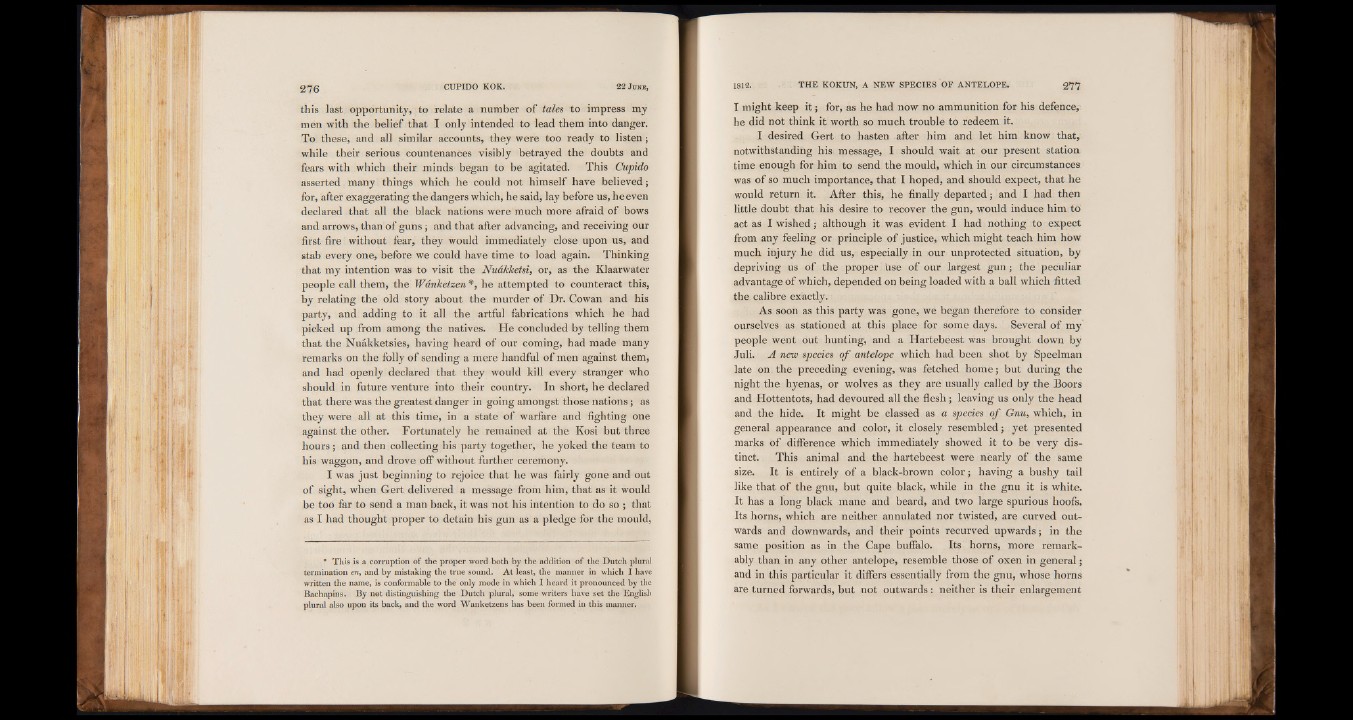
this last opportunity, to relate a number of tales to impress my
men with the belief that I only intended to lead them into danger.
To these, and all similar accounts, they were too ready to listen ;
while their serious countenances visibly betrayed the doubts and
fears with which their minds began to be agitated. This Cupido
asserted many things which he could not himself have believed;
for, after exaggerating the dangers which, he said, lay before us, he even
declared that all the black nations were much more afraid of bows
and arrows, than of guns ; and that after advancing, and receiving our
first fire without fear, they would immediately close, upon us, and
stab every one, before we could have time to load again. Thinking
that my intention was to visit the Nuâkketsi, or, as the Klaarwater
people call them, the Wânketzen *, he attempted to counteract this,
by relating the old story about the murder of Dr. Cowan and his
party, and adding to it all the artful fabrications which he had
picked up from among the natives. He concluded by telling them
that the Nuâkketsies, having heard of our coming, had made many
remarks on the folly of sending a mere handful of men against them,
and had openly declared that they would kill every stranger who
should in future venture into their country. In short, he declared
that there was the greatest danger in going amongst those nations ; as
they were all at this time, in a state of warfare and fighting one
against the other. Fortunately he remained at the Kosi but three
hours ; and then collecting his party together, he yoked the team to
his waggon, and drove off without further ceremony.
I was just beginning to rejoice that he was fairly gone and out
of sight, when Gert delivered a message from him, that as it would
be too far to send a man back, it was not his intention to do so ; that
as I had thought proper to detain his gun as a pledge for the mould,
* This is a corruption of the proper word both by the addition of the Dutch plural
termination en, and by mistaking the true sound. At least, the manner in which I have
written the name, is conformable to the only mode in which I heard it pronounced by the
Bachapins. By not distinguishing the Dutch plural, some writers have set the English
plural also upon its back, and the word Wanketzens has been formed in this manner.
I might keep it; for, as he had now no ammunition for his defence,
he did not think it worth so much trouble to redeem it.
I desired Gert to hasten after him and let him know that,
notwithstanding his message, I should wait at our present station
time enough for him to send the mould, which in our circumstances
was of so much importance, that I hoped, and should expect, that he
would return it. After this, he finally departed; and I had then
little doubt that his desire to recover the gun, would induce him to
act as I wished; although it was evident I had nothing to expect
from any feeling or principle of justice, which might teach him how
much injury he did us, especially in our unprotected situation, by
depriving us of the proper iise of our largest gun; the peculiar
advantage of which, depended on being loaded with a ball which fitted
the calibre exactly.
As soon as this party was gone, we began therefore to consider
ourselves as stationed at this place for some days. Several of my
people went out hunting, and a Hartebeest was brought down by
Juli. A new species of antelope which had been shot by Speelman
late on. the preceding evening, was fetched home; but during the
night the hyenas, or wolves as they are usually called by the Boors
and Hottentots, had devoured all the flesh; leaving us only the head
and the hide. It might be classed as a species of Gnu, which, in
general appearance and color, it closely resembled; yet presented
marks of difference which immediately showed it to be very distinct.
This animal and the hartebeest were nearly of the same
size. It is entirely of a black-brown color; having a bushy tail
like that of the gnu, but quite black, while in the gnu it is white.
It has a long black mane and beard, and two large spurious hoofs.
Its horns, which are neither annulated nor twisted, are curved outwards
and downwards, and their points recurved upwards; in the
same position as in the Cape buffalo. Its horns, more remarkably
than in any other antelope, resemble those of oxen in general;
and in this particular it differs essentially from the gnu, whose horns
are turned forwards, but not outwards: neither is their enlargement